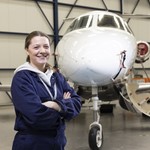

Aviation
Newcastle College Aviation Academy is a renowned multi-million-pound training facility at Newcastle International Airport.
A former winner of the Queen's Anniversary Prize for Higher and Further Education, we specialise in training world-class aviation engineers in a real-world environment, preparing you for a first-class career.
We offer full-time courses and degrees, meaning you can kick-start your engineering career with us and complete your degree, all in the same amazing facility.
Our curriculum is at the cutting edge of industry practice and we work with support from organisations like Newcastle Airport, the Royal Air Force, British Airways and Virgin Atlantic, preparing you for employment in the industry.
You will learn within one of our industry-standard aviation hangars or aboard our Boeing 737, working to maintain one of our Jet Provosts, Jetstream planes or brand-new private jet. We've recently invested in brand-new facilities and equipment at the Aviation Academy, including avionic training simulators and a Premier 1 Jet - a training aircraft with cockpit and operational gas turbine engines.
Next Event
Newcastle College University Centre Information and Clearing Events
Rye Hill Campus 14th-28th August 2025 Find out moreTake a closer look at our courses
Aviation at Newcastle College
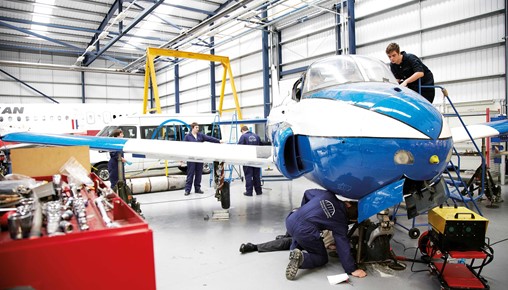
What can I do with a qualification in Aviation?
Daily tasks:
- Organises and establishes control systems to monitor operational efficiency and performance of materials and systems.
- Ensures that equipment, operation and maintenance comply with design specifications and safety standards.
- Designs mechanical equipment, such as steam, internal combustion and other non-electrical motors for railway locomotives, road vehicles, aeroplanes and other machinery.
- Determines materials, equipment, piping, capacities, layout of plant or system and specification for manufacture.
- Undertakes research and advises on energy use, materials handling, thermodynamic processes, fluid mechanics, vehicles and environmental controls.
Powered by EMSI
Daily tasks:
- Prepares specifications for materials and other components.
- Produces final design information for use in preparation of layouts, parts lists, etc..
- Arranges construction and testing of model or prototype and modifies design if necessary.
- Prepares working designs for steam, aero, turbine, marine and electrical engines, mechanical instruments, aircraft and missile structures, vehicle and ship structures, plant and machinery equipment, domestic electrical appliances, building systems and services, and electronic computing and telecommunications equipment.
- Assesses product requirements, including costs, manufacturing feasibility and market requirements.
Powered by EMSI
Daily tasks:
- Provides technical consultancy services.
- Examines and advises on patent applications.
- Prepare sketches, drawings and specifications showing materials to be used, construction and finishing methods and other details.
- Devises and implements control systems to monitor operational efficiency and performance of system and materials.
- Designs new systems and equipment with regard to cost, market requirements and feasibility of manufacture.
- Establishes principles and techniques to improve the quality, durability and performance of materials such as textiles, glass, rubber, plastics, ceramics, metals and alloys.
- Researches into problem areas to advance basic knowledge, evaluate new theories and techniques and to solve specific problems.
Powered by EMSI
Daily tasks:
- Accompanies pupil on training flights and demonstrates flying techniques.
- Performs specified tests to determine aircraft.
- Maintains radio contact and discusses weather conditions with air traffic controllers.
- Monitors fuel consumption, air pressure, engine performance and other indicators during flight and advises pilot of any factors that affect the navigation or performance of the aircraft.
- Directs or undertakes the operation of controls to fly aeroplanes and helicopters, complying with air traffic control and aircraft operating procedures.
- Directs or undertakes routine checks on engines, instruments, control panels, cargo distribution and fuel supplies.
- Studies flight plan, discusses it with flight deck crew and makes any necessary adjustments.
Powered by EMSI
Daily tasks:
- Monitors the standards of scientific and technical research undertaken by the research team.
- Plans work schedules, assigns tasks and delegates responsibilities to the research and development team.
- Develops research methodology, implements and reports upon research investigations undertaken.
- Liaises with production departments to investigate and resolve manufacturing problems.
- Establishes product design and performance objectives in consultation with other business functions.
Powered by EMSI
What can I do with a qualification in Aviation?
Mechanical engineers
Daily tasks:
- Organises and establishes control systems to monitor operational efficiency and performance of materials and systems.
- Ensures that equipment, operation and maintenance comply with design specifications and safety standards.
- Designs mechanical equipment, such as steam, internal combustion and other non-electrical motors for railway locomotives, road vehicles, aeroplanes and other machinery.
- Determines materials, equipment, piping, capacities, layout of plant or system and specification for manufacture.
- Undertakes research and advises on energy use, materials handling, thermodynamic processes, fluid mechanics, vehicles and environmental controls.
Powered by EMSI
Design and development engineers
Daily tasks:
- Prepares specifications for materials and other components.
- Produces final design information for use in preparation of layouts, parts lists, etc..
- Arranges construction and testing of model or prototype and modifies design if necessary.
- Prepares working designs for steam, aero, turbine, marine and electrical engines, mechanical instruments, aircraft and missile structures, vehicle and ship structures, plant and machinery equipment, domestic electrical appliances, building systems and services, and electronic computing and telecommunications equipment.
- Assesses product requirements, including costs, manufacturing feasibility and market requirements.
Powered by EMSI
Engineering professionals n.e.c.
Daily tasks:
- Provides technical consultancy services.
- Examines and advises on patent applications.
- Prepare sketches, drawings and specifications showing materials to be used, construction and finishing methods and other details.
- Devises and implements control systems to monitor operational efficiency and performance of system and materials.
- Designs new systems and equipment with regard to cost, market requirements and feasibility of manufacture.
- Establishes principles and techniques to improve the quality, durability and performance of materials such as textiles, glass, rubber, plastics, ceramics, metals and alloys.
- Researches into problem areas to advance basic knowledge, evaluate new theories and techniques and to solve specific problems.
Powered by EMSI
Aircraft pilots and flight engineers
Daily tasks:
- Accompanies pupil on training flights and demonstrates flying techniques.
- Performs specified tests to determine aircraft.
- Maintains radio contact and discusses weather conditions with air traffic controllers.
- Monitors fuel consumption, air pressure, engine performance and other indicators during flight and advises pilot of any factors that affect the navigation or performance of the aircraft.
- Directs or undertakes the operation of controls to fly aeroplanes and helicopters, complying with air traffic control and aircraft operating procedures.
- Directs or undertakes routine checks on engines, instruments, control panels, cargo distribution and fuel supplies.
- Studies flight plan, discusses it with flight deck crew and makes any necessary adjustments.
Powered by EMSI
Research and Development Managers
Daily tasks:
- Monitors the standards of scientific and technical research undertaken by the research team.
- Plans work schedules, assigns tasks and delegates responsibilities to the research and development team.
- Develops research methodology, implements and reports upon research investigations undertaken.
- Liaises with production departments to investigate and resolve manufacturing problems.
- Establishes product design and performance objectives in consultation with other business functions.
Powered by EMSI
Meet our students and tutors
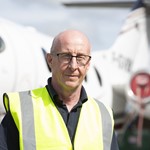
Jim King
Curriculum Leader - Aviation"In my six years at Newcastle College, I have seen many students go on to achieve great things. I love using the experiences I have had working in the Royal Air Force to inspire the next generation of aircraft engineers."
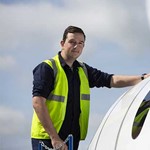
Max Elcoat
BSc in Aircraft Maintenance Engineering"Being at the airport, around the planes, and working in the hangar, you’re always focused on the end goal. But, for me, hands down, one of the best things about studying here is hearing from ex-students about where they are now. It’s so motivating see what you could be doing in a few years’ time, and it proves how good of a place it is. For instance, I had no idea that the current Maintenance Manager for Boeing UK studied here just ten years ago, until he came to give us a talk about his experience and career-to-date."
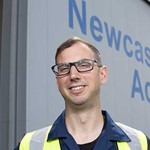
Mark Underwood
BSc in Aircraft Maintenance Engineering"You will leave here with a lot more than a degree. As well as all the core degree modules, you also complete some of the CAA modules towards your B1 Aircraft Maintenance Engineer's license, which you have to complete to be able to work as a mechanic. The Aviation Academy's strong links with employers is definitely a big benefit as well. I applied for lots of positions outside of those links, and I got hardly any responses, then BA came and did their annual visit, and invited me to interview, and then offered me a Junior Mechanic position, which I’ll be starting in the summer. !"
Get In Touch
Upcoming events

Newcastle College University Centre Information and Clearing Events
Rye Hill Campus
14th-28th August 2025
Employers,
do you want to...
Unlock the potential of your workforce?
Understand more about apprenticeships?
Find out about events and bespoke training solutions?
